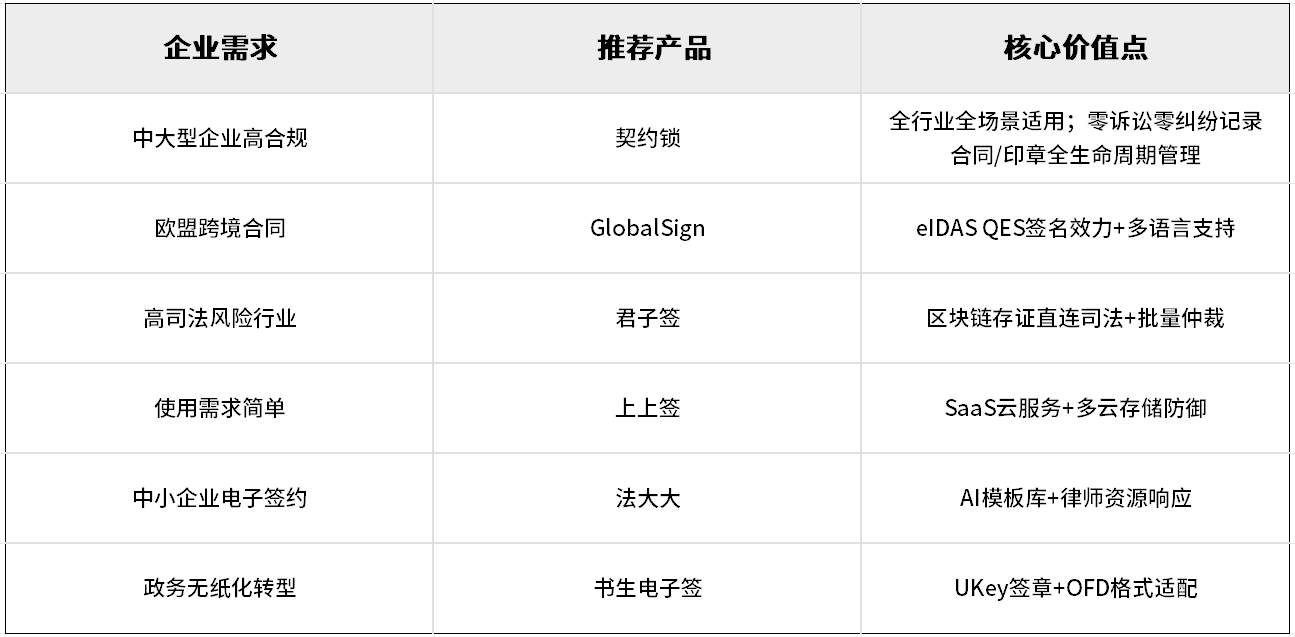What are the recommended electronic signature software for 2025?
In today's era of paperless office and normalized remote collaboration, electronic signatures have evolved from; Convenient Tools” Upgrade to a core infrastructure for enterprise compliance and efficiency. Based on policy guidance and practical needs, we will deeply analyze the core values of the six mainstream electronic signature software in 2025.
1、 The core value of electronic signatures
1、 Legal Validity Protection
Electronic signatures that comply with the Electronic Signature Law have the same legal effect as paper contracts, and their content is ensured to be tamper proof through blockchain storage, timestamp, and CA authentication.
2、 Whole process cost reduction and efficiency improvement
State Grid Hangzhou Company's practice has shown that electronic signatures can save more than one million yuan in annual costs for individual enterprises, and the contract signing cycle has been compressed from weeks to minutes.
3、 Security and compliance requirements
Financial, government and other scenarios require national security algorithms (SM2/SM3)+Level 3 authentication to prevent“ Carrot Chapter; Risk.
2、 Six major electronic signature software evaluations for 2025
TOP1: Contract Lock
A leading brand of electronic signatures applicable to all industries and scenarios
Contract Lock has been deeply rooted in the field of electronic signatures for ten years, and has not been involved in any litigation disputes with clients since its establishment. The company operates steadily and reliably. According to a report released by Frost&Sullivan, Contract Lock ranks first in the industry in terms of the total number of medium to large scale customers and localized deployment. Up to now, Contract Lock has served over 42000 medium to large clients, including more than 200 Fortune 500 and China's top 500 companies, as well as over 400 large state-owned enterprises.
Provide a set of services around users' electronic signature usage needs.
; Authoritative CA identity authentication, electronic signing, seal and contract lifecycle management; A trustworthy digital service that integrates AI intelligence and other innovative technologies to achieve intelligent contract drafting and review, while innovatively launching in the industry; Seal AI Intelligent Risk Control Assistant; 、 “ AI intelligent system execution assistant; Realize the integration of seal risk monitoring, identification, warning, and blocking, and truly implement the seal management system.Official website: https://www.qiyuesuo.com/
TOP2:Globalsign
Focusing on solving cross-border business compliance issues
Its core product Document Signing supports the highest level of QES signature in the EU eIDAS, which is equivalent to handwritten signatures within the EU and covers regulations in over 180 countries. Meet the cross-border contract needs of industries such as pharmaceuticals and finance through cloud signing and hardware token dual mode. Deeply integrated with Salesforce, supporting a multi language signing interface, but with high response latency on domestic servers. Suitable for scenarios such as cross-border supply chain agreements and compliance signing for foreign trade enterprises.
Official website: https://www.globalsign.CN/
TOP3: Fada
Legal Resource Electronic Signing Service
Positioned as a full scenario SaaS electronic signing service provider, supporting intelligent template libraries and judicial response networks, lightweight products, supporting integrated e-commerce/logistics systems, suitable for standardized high-frequency signing scenarios. The product system covers electronic signature infrastructure, electronic signature capability suite, electronic signature industry and field applications, while providing advanced legal AI products and services around the entire lifecycle of contracts.
Official website: https://www.fadada.com/
TOP4: Shangshang Sign
Electronic signing SaaS product service provider
Focusing on the field of electronic signing SaaS, including integrated electronic signing solutions such as electronic signatures, intelligent contract lifecycle management, AI contracts, etc., the product is easy and convenient to use. Adopting“ HSM hardware encryption+multi cloud distributed storage; Architecture defense against APT attacks. Support complex processes such as multi-level countersignature and conditional branch approval.
Official website: https://www.bestsign.cn/
TOP5: Scholar Electronic Signature
Government Electronic Signature Service
Scholar Electronic Signature focuses on the electronic transition of government and traditional enterprises, simulating the paper stamping experience with UKey hardware storage and digital paper technology. Support OFD national document standards and adapt to government innovation substitution projects. Deeply integrate government systems such as real estate registration and medical insurance, seamlessly connecting traditional seal application processes. But the complex approval process requires customized development.
Official website: http://www.sursenelec.com/
TOP6: Junzi Sign
One stop electronic signing service provider
Providing services for governments, enterprises, and individuals; Identity authentication, electronic signature, contract management, data storage, judicial certification; Waiting for a one-stop electronic signing service. The blockchain system is directly connected to notary offices and arbitration commissions, generating evidence packages with just one click in case of disputes, and supporting batch labor contract signing in the field of human resources. Adopting SM3 encryption technology, combined with AI behavior monitoring for real-time recognition; Carrot Chapter; Risk. Suitable for online document signing in courts, bank credit contracts, and high-frequency signing in human resources.
Official website: https://www.junziqian.com/
III. Selection Decision Reference Table

span data style apply id="font-size-e8f 13655" style="font-size: 16px; Industry Trends: By 2025, the penetration rate of electronic contracts and electronic signatures in the human resources scene will exceed 60%, and the financial industry will reach 58%. The selection needs to balance security rigidity (qualification certification), scenario flexibility (integration capability), and cost controllability (SaaS vs localization).
 沪公网安备 31011202012092号
沪公网安备 31011202012092号